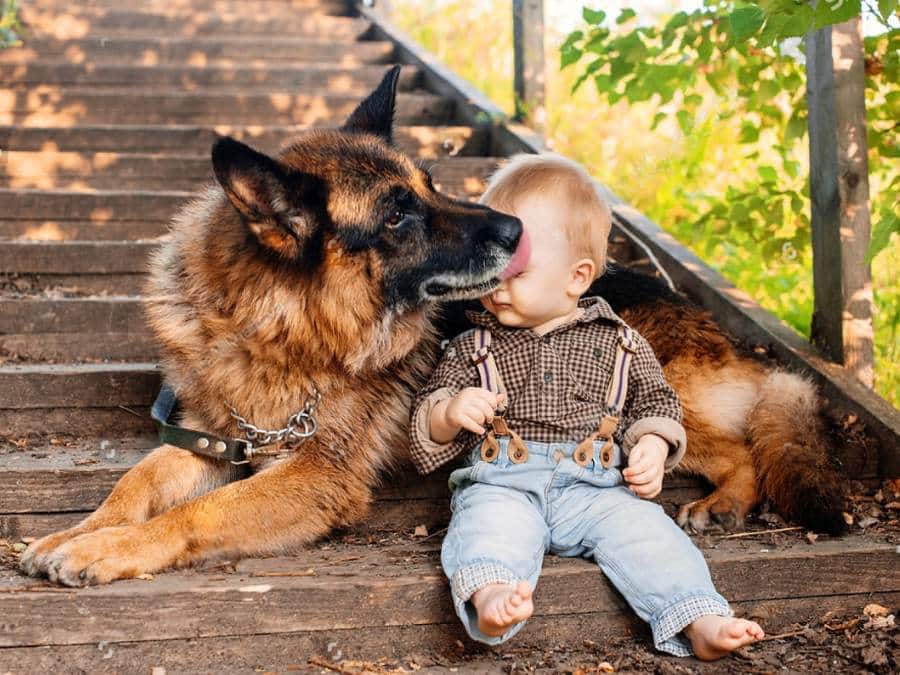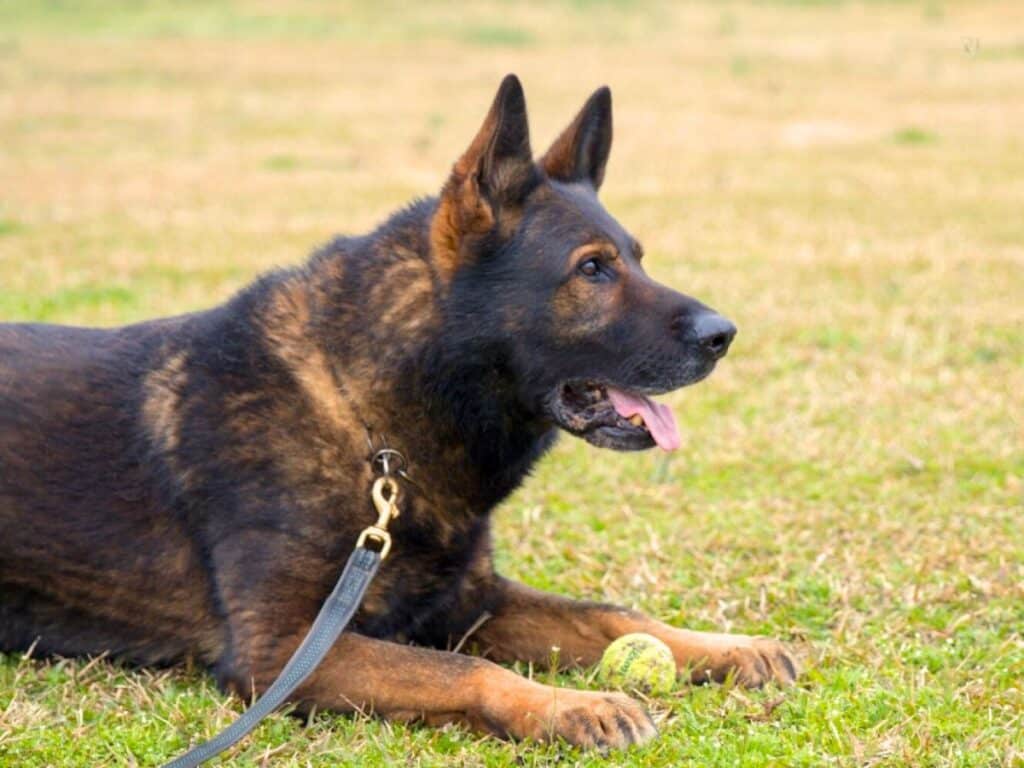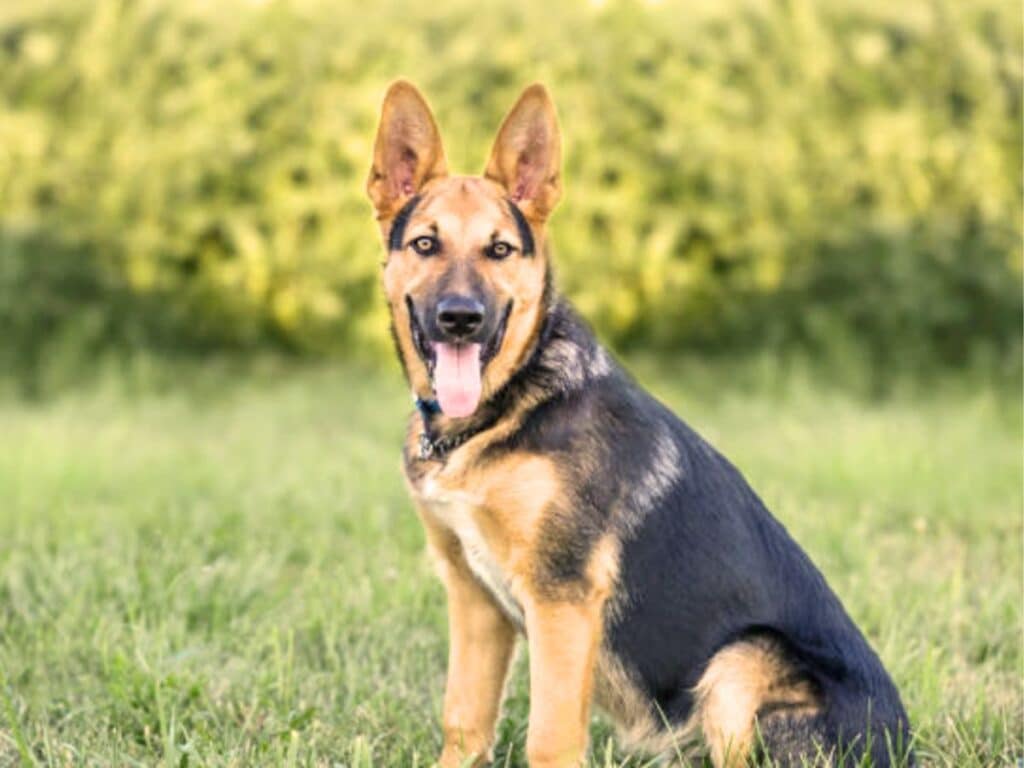Thinking about bringing home a dog, but worried if it is safe to adopt a German Shepherd? While they make excellent family pets and companions, their size and energy levels sometimes is a concern for those with small children and other pets at home.
Well, the good news is that despite their size and strength, with proper training and socialization German Shepherds are gentle and affectionate towards children in the family.
In this article, I will try my best to convince you that adopting a German Shepherd is safe even if you have a baby at home.
Is It Safe To Adopt A German Shepherd?
Yes, adopting a German Shepherd can be safe with proper preparation. These intelligent, loyal dogs thrive on training, socialization, and regular exercise. Ensure your commitment to their mental and physical well-being for a rewarding companionship.
German Shepherds have long been associated with aggression, but the reality is quite different. These dogs can be incredibly loyal and protective when given proper training and socialization.
They are known for forming strong bonds with their families, often becoming fiercely protective of their loved ones.
Are German Shepherds Good With Kids?
Yes, German Shepherds are generally good with kids. They are known for their loyalty and protective nature, which can make them great family pets.
With early exposure to kids, they can develop into loving companions who look out for the little ones. This loyalty makes them excellent choices for families seeking a devoted pet that will watch over them.
However, it’s important to socialize and train them properly from a young age to ensure they are well-behaved around children and babies.
Additionally, supervision is always recommended when any dog is around young children to prevent any potential accidents. Overall, with the right training and socialization, German Shepherds can be wonderful companions for kids.
RELATED:
Are German Shepherds Good With Other Pets?
It’s commonly believed that all German Shepherds possess high prey drives, but this isn’t always true. While some individuals may exhibit strong predatory instincts, not every dog of this breed displays such behavior.
Many German Shepherds coexist peacefully with other pets in the household without any issues or conflicts.
In fact, with proper socialization from an early age, these dogs can learn to live harmoniously alongside cats or other small animals within the home environment.
Their adaptability allows them to adjust well to various living situations as long as they receive adequate training and guidance from their owners.
RELATED: Are German Shepherds Good With Cats?
You can also refer to my article Rescuing a German Shepherd: Step-by-Step Guide. It’s a comprehensive guide on adopting a rescue German Shepherd that covers everything from the adoption process and preparing your home for the new dog to navigating the initial days and weeks with valuable tips on transitioning your rescue GSD into your family.

How To Check If A German Shepherd Is Safe For Kids
Assessing the compatibility between a soon-to-be-adopted German Shepherd and kids is crucial for ensuring a safe and harmonious environment. Here are some steps and considerations to help with this assessment:
Temperament Evaluation
- Spend time observing the German Shepherd’s behavior in various situations.
- Look for signs of friendliness, calmness, and tolerance around new people, including children.
RELATED: How To Adopt A German Shepherd?
History and Background
- Gather information about the dog’s history and previous interactions with children, if available.
- Ask the adoption agency or previous owners about any known experiences with kids.
Meet and Greet
- Arrange a controlled meeting between the German Shepherd and the children in a neutral environment
- Observe how the dog reacts to the presence and actions of the kids.
Body Language
- Pay close attention to the dog’s body language. Signs of a positive interaction include a wagging tail, relaxed posture, and friendly approach.
- Watch for any signs of stress, fear, or aggression, such as raised hackles, growling, or avoidance.
Supervised Interaction
- Initially, keep interactions between the dog and kids supervised and controlled.
- Allow the dog and children to get comfortable with each other gradually.
Obedience and Training
- Check the dog’s level of obedience and training. A well-trained German Shepherd is more likely to respond positively to commands and cues around children.
- Assess the dog’s reaction to basic commands and its ability to stay calm in various situations.
Desensitization Exercises
- Expose the German Shepherd to common scenarios involving kids, such as playtime, loud noises, or sudden movements.
- Observe how the dog reacts and if it remains calm and composed.
Resource Guarding Assessment
- Evaluate the dog’s behavior regarding food, toys, and other possessions. Ensure there are no signs of resource guarding, especially when children are around.
If uncertain, seek the advice of a professional dog trainer or behaviorist. They can provide additional insights and guidance on introducing a German Shepherd to a household with children.
Remember, every dog is an individual, and their behavior can be influenced by various factors, including training, socialization, and past experiences. By taking these steps and being patient and observant, you can make a more informed assessment of a German Shepherd’s compatibility with kids.
RELATED: How Much Does It Cost To Adopt A German Shepherd?

How To Assess A German Shepherd’s Compatibility With Other Pets
Here are some steps and considerations to help assess the compatibility of a GSD with other pets at home:
Introduction in a Controlled Environment
Introduce the German Shepherd to other pets in a controlled and neutral environment. Avoid bringing them into the German Shepherd’s territory initially.
Keep both the German Shepherd and other pets on leashes or in separate enclosures for the first meeting.
Observe Body Language
Pay close attention to the body language of both the German Shepherd and the other pets during the introduction.
Look for signs of curiosity, friendliness, or calmness. Be cautious of any signs of stress, fear, aggression, or territorial behavior.
Gradual Introductions
Allow for gradual introductions, starting with brief and supervised interactions.
Increase the time spent together gradually, monitoring their behavior and interactions.
Supervised Interactions
Always supervise interactions between the German Shepherd and other pets until you are confident in their compatibility.
Be especially vigilant during feeding times or when there are valuable resources, such as toys or beds.
Neutral Territory
If possible, introduce the pets on neutral ground, such as a park or a friend’s backyard, before bringing them into your home.
Separation When Necessary
If there are signs of tension or discomfort, separate the pets and try again later.
Gradually increase the time they spend together once they become more accustomed to each other.
Consider Individual Personalities
Take into account the individual personalities and energy levels of both the German Shepherd and other pets.
Some pets may be more accepting of new companions, while others may be more territorial.
Professional Guidance
If you are unsure or encounter difficulties, seek the guidance of a professional dog trainer or behaviorist.
A professional can provide valuable insights and strategies for introducing a German Shepherd to other pets.
Remember, patience and gradual introductions are key when bringing a new pet into a household with existing animals. Each pet is unique, and compatibility can vary.
RELATED: Where Can I Adopt A German Shepherd Puppy?

Tips For Safe Integration of an Adopted German Shepherd Into Your Family
Ensuring the safety of your adopted German Shepherd for your family and other pets involves a combination of preparation, training, and ongoing management.
Here are some tips to help make the integration safe and successful:
Thorough Assessment
Before adoption, thoroughly assess the German Shepherd’s temperament, behavior, and history, especially in relation to families and other pets.
Professional Evaluation
If possible, seek the guidance of a professional dog trainer or behaviorist to assess the German Shepherd’s behavior and compatibility with your family and other pets.
Slow and Controlled Introductions
Introduce the German Shepherd to family members and other pets gradually and in controlled environments.
Use leashes, gates, or barriers to ensure everyone’s safety during initial interactions.
Obedience Training
Invest time in basic obedience training for the German Shepherd. Commands like sit, stay, and recall are essential for safety and control.
Socialization
Socialize the German Shepherd with various people, environments, and other animals. Proper socialization can reduce fear and anxiety.
Supervision
Always supervise interactions between the German Shepherd, family members, and other pets, especially during the initial stages of integration.
Establish Rules and Boundaries
Establish clear rules and boundaries for the German Shepherd. Consistency is key in reinforcing these rules to ensure a well-behaved pet.
Resource Management
Manage resources such as food, toys, and sleeping areas to avoid potential conflicts. Teach the German Shepherd to share and respect the belongings of other pets.
Regular Exercise
Ensure the German Shepherd gets regular exercise to expend energy and reduce potential behavioral issues. A tired dog is often a well-behaved dog.
Healthcare
Schedule regular veterinary check-ups and vaccinations to ensure the overall health of the German Shepherd. Address any health concerns promptly.
Address Behavioral Issues Promptly
If behavioral issues arise, address them promptly. Seek professional help if needed to prevent the escalation of problems.
Safe Spaces
Provide safe spaces for the German Shepherd and other pets to retreat to when they need a break or some alone time.
Educate Family Members
Ensure that all family members, including children, understand the proper way to interact with and handle the German Shepherd. Educate them about signs of stress or discomfort in the dog.
Patience and Consistency
Be patient and consistent in training and interactions. Building a positive and safe relationship takes time, and consistency is crucial.
Remember that every dog is an individual, and their behavior can be influenced by various factors. By following these tips and adapting them to the specific needs of your adopted German Shepherd, you can help ensure a safe and happy integration into your family and with other pets.
RELATED: 10 Reasons To Adopt A German Shepherd

How To Deal With Behavior Issues In a Rescue GSD
Addressing behavior issues in a rescue dog requires patience, understanding, and consistent training. Here are some common behavior issues that rescue GSDs may exhibit, along with tips on how to address them:
- Fear and Anxiety:
- Behavior: Timidness, cowering, excessive trembling, or avoidance.
- Tips: Provide a calm and secure environment. Gradually expose the dog to new experiences, people, and places. Use positive reinforcement to build confidence.
- Aggression:
- Behavior: Growling, barking, or biting in response to perceived threats or fear.
- Tips: Identify triggers and gradually desensitize the dog to them. Consult a professional trainer or behaviorist for guidance. Focus on positive reinforcement and reward calm behavior.
- Separation Anxiety:
- Behavior: Destructive behavior, excessive barking, or distress when left alone.
- Tips: Establish a routine, use crate training gradually, and provide enrichment toys. Gradually increase the time the dog spends alone to build confidence.
- Resource Guarding:
- Behavior: Aggression when protecting food, toys, or other possessions.
- Tips: Teach the dog to associate positive things with humans approaching their resources. Use a “trade-up” method by offering a better item in exchange for what they are guarding.
- Leash Reactivity:
- Behavior: Pulling, lunging, or barking on the leash in response to other dogs or stimuli.
- Tips: Practice leash training in low-distraction environments. Gradually expose the dog to different stimuli, rewarding calm behavior. Consider professional guidance for desensitization exercises.
- Excessive Energy:
- Behavior: Destructive behavior, hyperactivity, or overexcitement.
- Tips: Provide regular exercise and mental stimulation. Use puzzle toys, engage in play, and consider obedience training to channel energy positively.
- House Training Issues:
- Behavior: Accidents indoors, difficulty in learning appropriate elimination areas.
- Tips: Establish a consistent routine for feeding and bathroom breaks. Use positive reinforcement and praise when the dog eliminates in the correct area. Be patient and consistent with house training.
- Territorial Behavior:
- Behavior: Excessive barking, guarding spaces, or marking indoors.
- Tips: Gradually expose the dog to different environments and people. Reinforce positive behaviors with rewards. Consider professional training for territorial issues.
- Nervousness Around People or Dogs:
- Behavior: Shyness, avoidance, or nervousness in social situations.
- Tips: Gradual socialization in controlled environments. Use positive reinforcement to build positive associations with people and other dogs.
- Jumping Up:
- Behavior: Excitement-induced jumping on people.
- Tips: Teach the dog alternative behaviors like sitting for attention. Ignore or redirect the dog when it jumps and reward calm behavior.
It’s important to note that individual rescue dogs may exhibit a combination of these behaviors, and a tailored approach based on the dog’s specific needs is often most effective. Consulting with a professional dog trainer or behaviorist can provide personalized guidance for addressing and managing behavior issues in rescue dogs.
Final Remarks
So, is it safe to adopt a German Shepherd? Well, if you’re willing to put in the time, effort, and love, adopting a German Shepherd can be a rewarding experience for both you and the dog. Assessing your compatibility, and understanding their behavior with children and other pets are crucial steps in making an informed decision. Remember, every dog is unique, and it’s essential to consider individual temperament and needs
Frequently Asked Questions
Are German Shepherds good with young children?
Yes, they can be great family dogs with proper training and supervision. Their protective nature often makes them excellent guardians for kids.
Can German Shepherds coexist with other pets?
With early socialization and training, many German Shepherds can live harmoniously with other pets. However, individual temperament varies so it’s important to introduce them carefully.
Are German Shepherds suitable for homes with babies?
German Shepherds can be gentle around babies when properly trained and supervised. Establishing boundaries and providing positive reinforcement is essential to ensure a safe environment for both the dog and the baby.
What should I consider before bringing home a German Shepherd?
Consider your activity level, time commitment, living space, and willingness to train consistently. A well-cared-for German Shepherd can bring immense joy but requires dedication from their human companion.
FURTHER READING:




